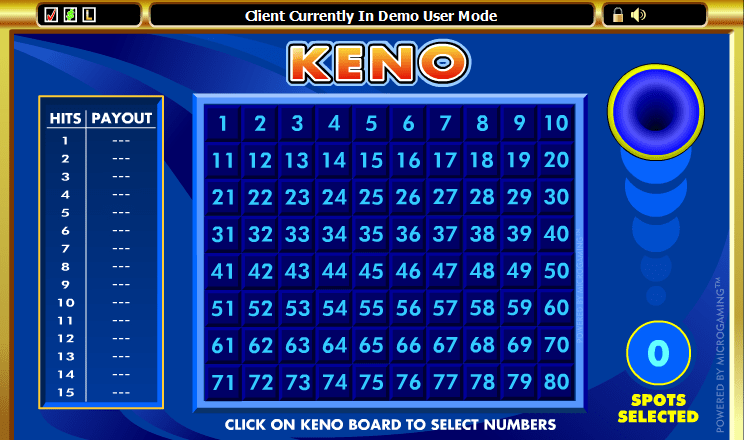Who Invented Keno and Where it can be Played?

Keno is one of the most famous and often played casino games of all, and has been for many years. Walk into any casino in the world and you will likely find a keno game to play, and the same is true in the constantly growing world of online casinos, too.
Most people know how keno is played, though, with a familiar and easy to learn format that has players picking between 1 and 20 numbers to play, then crossing their fingers as numbered balls are randomly chosen (usually 20 in all out of a possible 80 balls) and seeing how many of the numbers they correctly guessed. The more, the better, of course, with a perfect 20 out of 20 keno card being the stuff of legend…and millionaires.
History of Keno
Where did the game come from, though? Who invented it, and was it always played the way that it is today? Did it start in casinos, bingo halls, or in the streets somewhere in some form? Let’s look at the history of this well-known casino game.
Many mistakenly believe that keno comes from France because the word “keno” itself has French origins (as well as Latin). However, what most people don’t know is that the game likely originated in China, not France.
Who Invented Keno
There are legends that give varying accounts of where the game may have come from, including that the game itself generated enough money to build the Great Wall of China. This seems unlikely, though, especially since lotteries weren’t used to build government buildings or resources until years after the wall was built.
It was in the mid 1800s that lottery games began being played by many people in China, and supposedly, results of the games were transmitted via carrier pigeons. The games were played with sheets that had characters, though not necessarily numbers.
The game started to spread when Chinese immigrants brought it with them to the Wild West when they were building railroads in the later 19th century. Somehow, as the game traveled from person to person, it picked up a new name: “keno”. By the 1860s, cowboys were playing keno in Texas, and the game was a part of not just Chinese, but American tradition.
Keno Today

Today, keno is enjoyed not just in China and the United States, but all over the world, in places such as Australia, New Zealand, Canada, England, and yes, France. It’s hard to imagine a casino in the world that wouldn’t have at least some form of keno to be played, whether it would be a high roller’s casino in Las Vegas or a typical casino in Australia.
Online casinos have the same basic game available as the traditional casinos do, but there are a few changes that have to be made, such as having the numbers selected via a random number generator instead of using physical balls that are selected randomly. Otherwise, the game is about the same, with perhaps more variations online than in real-life casinos.
From ancient China to the rest of the world and even the Internet, keno has spread greatly in the past few hundred years. Keno has made many into millionaires and given just about everyone who has ever played it at least one or two good stories to tell.
Keno Game Play

When playing Keno players wager by choosing numbers ranging from 1 through (usually) 80. After all players make their wagers, 20 numbers (some variants draw fewer numbers) are drawn at random, either with a ball machine similar to ones used for lotteries and bingo, or with a random number generator.
Each casino sets its own series of payouts, called “paytables”. The player is paid based on how many numbers were chosen (either player selection, or the terminal picking the numbers), the number of matches out of those chosen, and the wager.
There are a wide variety of keno paytables depending on the casino, usually with a larger “house edge” than other games, ranging from less than 4 percent to over 35 percent in online play, and 20-40% in in-person casinos. By way of comparison, the typical house edge for non-pokies casino games is under 5%.
What Britannica says about history of Keno
History of Keno in Australia

Keno is a gambling product available throughout Australia in which the player bets on the outcome of a draw of numbers selected by a random number generator. Prizes are awarded against the winning numbers drawn in each game.
In 1991 Keno started being played in NSW registered clubs and was then introduced into other Australian states and territories.
History of keno in Victoria Keno was introduced in Victoria in 1994 under the brand Club Keno. Club Keno was conducted under an authorisation granted to the two gaming machine operators, Tatts Group Limited (Tatts) and Tabcorp Holdings Limited (Tabcorp), through a consortium under a joint venture. Club Keno ceased on 14 April 2012 following a major restructure of the gambling industry in Victoria and was replaced with keno offered under a licence granted to Tabcorp.
Games of keno are run by one lottery organisation: South Australian Lotteries. In history of Keno Tattersall’s previously offered Tatts Keno until the end of June 2008, at which point it lost its Victorian government licence to run the game. It has been replaced by the Intralot-run Lucky Keno.
SA Lotteries Keno
SA Lotteries’ Keno operates on a continuous basis of one draw every 3.5 minutes, with draws closing 40 seconds before each draw. Results appear on monitors located at most lotteries sales outlets. South Australian Keno can be played using all Spot entries from 1 to 10 numbers. It offers one jackpot prize, for matching all numbers from a Spot 10 ticket, with a minimum prize of $1 million (which was changed from a $1 million fixed prize to a jackpotting prize in February 2001). The probability varies from spot to spot.
Since November 1997, history of keno SA Lotteries has syndicated Keno to the Australian Capital Territory’s ACTTAB where it is marketed as ACTTAB Keno.
In May 2010, history of keno a “Keno Coin Toss” side-bet feature was added to Keno, which pay on which half of the board (“Heads”: numbers 1–40; “Tails”: numbers 41–80 – each paying $2 per $1 bet) has more drawn numbers, or whether they are equal, with ten numbers drawn in each half (“Evens” – paying $4 per $1 bet).
Other Operators
Keno is also popular in clubs, hotels and casinos. Tabcorp Holdings, through its ownership of Jupiters Limited, runs Keno draws through their casinos in New South Wales and Queensland, and also other gaming venues in these states and in Victoria. SKYCITY Darwin runs NT Keno on behalf of venues in the Northern Territory.
Both these games run continuously (every 3–3.5 minutes), and offer jackpots for each level between 7 and 10 spots (NT Keno also has a Spot 6 jackpot). Both games also have a high/low option called Heads or Tails which pre-date and are played identically to the current “Coin Toss” feature in SA Lotteries’ Keno. Some NSW venues also offer a Keno Racing game, which groups each line of 10 numbers as a “runner” in a “race” of eight, with positions based on the number and timing of numbers drawn; traditional horse-racing bets are offered such as “Win”, “Place”, “Trifecta” and so on.
Keno Payouts

According to experts Keno payouts are based on how many numbers the player chooses and how many of those numbers are “hit”, multiplied by the proportion of the player’s original wager to the “base rate” of the paytable. Typically, the more numbers a player chooses and the more numbers hit, the greater the payout, although some paytables pay for hitting a lesser number of spots. For example, it is not uncommon to see casinos paying $500 or even $1,000 for a “catch” of 0 out of 20 on a 20 spot ticket with a $5.00 wager. Payouts vary widely by casino. Most casinos allow paytable wagers of 1 through 20 numbers, but some limit the choice to only 1 through 10, 12 and 15 numbers, or “spots” as keno aficionados call the numbers selected.
Wikipedia says that the probability of a player hitting all 20 numbers on a 20 spot ticket is approximately 1 in 3.5 quintillion (1 in 3,535,316,142,212,174,320).
Even though it is highly improbable to hit all 20 numbers on a 20 spot ticket, the same player would typically also get paid for hitting “catches” 0, 1, 2, 3, and 7 through 19 out of 20, often with the 17 through 19 catches paying the same as the solid 20 hit. Some of the other paying “catches” on a 20 spot ticket or any other ticket with high “solid catch” odds are in reality very possible to hit. Probabilities change significantly based on the number of spots and numbers that are picked on each ticket.
Online Keno Numbers

With the maximum numbers drawn is 20, you do not want to choose that many since the odds are against you. The odds for correctly guessing just 14 numbers is 1:390 million and selecting all 20 is considered impossible. The five numbers most often drawn in online or video Keno are 1, 4, 23, 34 and 72, though these “hot” numbers will change as players refer back to the last draw numbers in their particular variant of online or video Keno.
With “cold” numbers listed as 7, 12 and 23 it is worth remembering that numbers are picked at random by computer, so choices are highly unpredictable since past performance has no correlation with future performance, but many players feel that it adds to the entertainment of the game.
Keno games in Australia at lottery retailers are Keno Mega Millions, Keno Super Jackpot, Keno Classic and others. Video keno games are played at online casinos that include keno games from standard game board to interactive keno like pokies games to play.
Most online Keno players will select between five and 10 numbers depending on the odds offered on different game variants, since the optimal variant on some games may be five or six numbers only. Whilst playing with your favorite numbers is fun, consider your other strategies. In online Keno, a payout is based on the percentage of numbers you match or “catch”. This means that if you choose eight numbers and six match, you win more than if you bet on 14 numbers and seven match.


